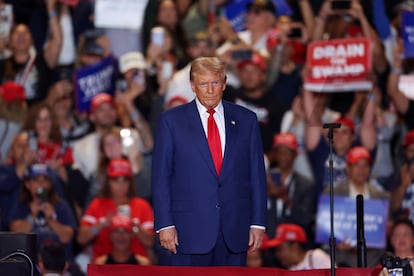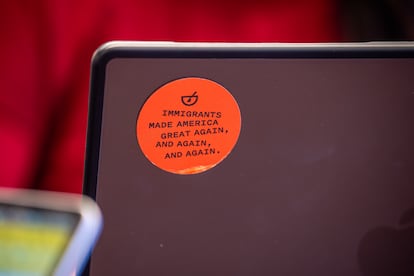Trump erodes trust in election by insisting on the lie that illegal immigrants vote
The Republican presidential candidate has been making the same claim since he won in 2016, and this year he has reinforced the message ahead of November 5


At first glance, it could be any ad aimed at Latino voters: a voice-over in Spanish asserts that in the United States “voting is a sacred right” and urges the viewer to exercise it. “If you are an American citizen, do your duty: register to vote,” the voice exhorts. But the tone of the ad changes abruptly after 13 seconds: the montage of smiling Latinos disappears, replaced by a white background on which one can read: “It is illegal for non-citizens to vote in federal elections, including the 2024 presidential election.” And the announcer finishes: “Doing so is generally a federal crime and can lead to deportation.”
This ad, launched last week by a conservative organization with ties to Donald Trump, is just the latest example of the Republican Party’s crusade against what it sees as the greatest threat to this year’s presidential election: widespread voting by non-citizens. The Republican candidate and his allies have spent the last few months of the campaign — actually, the last few years — feeding the lie that thousands of undocumented immigrants in the country vote illegally and that on November 5 they could alter the outcome of the election, despite the fact that, as the new ad campaign points out, only U.S. citizens have the right to vote in federal elections.
Even though the evidence clearly refutes this Republican narrative, after eight years of repeating the same lie, a majority of Americans believe it. Specifically, 51% of all voters — and 82% of Republicans — are concerned about non-citizens voting in November, according to a poll released last week. Thus, the idea that illegal immigrants vote in large numbers has been the sledgehammer with which Trump has crushed confidence in the electoral process.
Voting is a privilege for U.S. citizens, not illegal immigrants. Know the law and be informed before Election Day.
— The Article III Project (A3P) (@Article3Project) September 20, 2024
Our sister organization, Article III Foundation, has an important message you need to listen to: pic.twitter.com/J8IauyKGoP
In the weeks leading up to the election, and as early voting gets underway across the country, the ad campaign, funded by the Article III Foundation — whose founder, Mike Davis, is a close ally of the former president — will air in key battleground states like Arizona, Nevada, and Pennsylvania, all of which have significant Latino populations. The $1 million ad will air on ESPN Deportes, Galavisión, Univision and other Spanish-language cable channels, as well as on Spanish-language radio, according to NBC News.
Davis — who is rumored to be in line to become Trump’s attorney general if the former president returns to the White House — defends the ad as a public service announcement, but the video also has another effect: casting doubt on the integrity of the nation’s electoral system, a tactic Trump used to challenge the results of the 2016 and 2020 elections. Four years later, in what he has called his final presidential campaign, the Republican has returned to the same strategy. And with every rally, interview or debate in which he argues that noncitizens’ votes will determine the outcome of the November election, he appears to be laying the groundwork for rejecting what citizens decide at the ballot box.
Three different electoral cycles, one lie
On September 10, during the presidential debate against Kamala Harris, Trump accused the Democratic administration of allowing millions of migrants into the country to vote in the November elections. “They don’t even know how to speak English. They don’t even know what country they’re in, practically. And these people are trying to get them to vote, and that’s why they’re allowing them to come into our country,” said the Republican, repeating a conspiracy theory that he began spreading almost a decade ago.
In 2016, when the Republican won the election against Hillary Clinton but lost the popular vote, he was quick to blame the alleged illegal immigrant vote for the loss. “I won the popular vote if you discount the millions of people who voted illegally,” he wrote on his social networks a couple of weeks after the vote that year, without offering any evidence. Later, as president and during a meeting with congressional leaders, Trump went further and stated that he would have won the popular vote if it were not for the votes of between three and five million immigrants residing illegally in the country. And four months into his presidency, in May 2017, he created a committee to investigate the alleged fraud. This body later dissolved without identifying a single case of a vote cast by a non-citizen.
Four years later, Trump again raised the spectre of electoral fraud by refusing to accept his defeat to Joe Biden in 2020. His lies about the alleged fraud that cost him a second presidency resulted in the storming of the Capitol on January 6, 2021, and Trump is now facing two criminal charges for his efforts to overturn the results of that year’s election.
Now, with less than 45 days to go before the polls, the former president and his supporters are continuing to push the lie, even trying to link federal government funding to states requiring proof of citizenship when people register to vote. Although House Speaker Mike Johnson failed to get a bill to prevent a partial government shutdown to address alleged illegal voting by immigrants, Trump made it clear that he was willing to shut down the government on the eve of the election if he didn’t get his way.

Without evidence
It is illegal for a person who is not a U.S. citizen to register or vote in any state or federal election. Anyone who commits this offense faces a fine or imprisonment of up to one year, or both, and the possibility of deportation. However, federal law does not prevent states or municipalities from granting noncitizens the right to vote in local elections. Some territories have done so, including several cities in Maryland, California, and Illinois, while other states, such as Ohio and Louisiana, have banned the practice.
In addition, more and more states are seeking to tighten requirements for citizens to prove their citizenship in order to vote, requiring, for example, that they present a passport or a birth or naturalization certificate when registering. Voting rights organizations insist that these requirements — like those Trump sought to implement through legislation to avoid a government shutdown — end up hindering or even suppressing the vote of many people who, even if they are citizens, do not have easy access to the relevant documents.
Along those lines, organizations like the Brennan Center, a nonpartisan law and policy institute, consider that requiring proof of citizenship is an unnecessary formality when research shows that it is extremely rare for a non-citizen to vote. Regarding the 2016 election in particular, a study by this same center found that in 42 jurisdictions, representing a total of 23.5 million votes, election officials detected only 30 incidents of suspected non-citizen voting. That is, only 0.0001% of votes were suspected to have been cast illegally by immigrants who lacked citizenship.
More recently, in 2022, an audit of Georgia’s voter rolls found about 1,600 cases of noncitizens who tried to register to vote between 1997 and 2022, but none were successful. Additionally, the Heritage Foundation, the conservative group behind the controversial Project 2025, has a nationwide voter fraud database that includes only 85 cases of noncitizen voting from 2002 through last year.
Despite all the evidence that contradicts his claims, Trump continues to cling to the lie. And in doing so, he is showing what his excuse will be if he loses, while also instilling fear among legal immigrants who are allowed to vote this year but may decide not to do so for fear that their immigration status will be questioned when they go to the polls. Attorney Cesar Ruiz, of the organization Latino Justice, points out that this disproportionately affects Latino immigrants, whose “families tend to be of mixed status,” meaning some are citizens while others are not, so the possibility of deportation is very present.
“They may be uneasy or nervous about the rhetoric and decide not to vote,” he said. “But even when they do vote legally, we see attempts to suppress their vote. So we are ready and preparing for that reality, understanding that these are going to be very close elections, particularly in areas where Latinos also have a very significant population.”
Trump planted the seed in 2016 and has continued to reap the fruits ever since, with the help of his supporters. In just the past four years, the candidate and his allies have filed a handful of lawsuits challenging voter registration procedures in several states, including Texas, Nevada and Arizona, territories that concentrate a significant part of the Latino electorate. In addition, there have been lawsuits in Michigan and Pennsylvania, two of the key territories that are expected to decide the elections.
Sign up for our weekly newsletter to get more English-language news coverage from EL PAÍS USA Edition
Tu suscripción se está usando en otro dispositivo
¿Quieres añadir otro usuario a tu suscripción?
Si continúas leyendo en este dispositivo, no se podrá leer en el otro.
FlechaTu suscripción se está usando en otro dispositivo y solo puedes acceder a EL PAÍS desde un dispositivo a la vez.
Si quieres compartir tu cuenta, cambia tu suscripción a la modalidad Premium, así podrás añadir otro usuario. Cada uno accederá con su propia cuenta de email, lo que os permitirá personalizar vuestra experiencia en EL PAÍS.
¿Tienes una suscripción de empresa? Accede aquí para contratar más cuentas.
En el caso de no saber quién está usando tu cuenta, te recomendamos cambiar tu contraseña aquí.
Si decides continuar compartiendo tu cuenta, este mensaje se mostrará en tu dispositivo y en el de la otra persona que está usando tu cuenta de forma indefinida, afectando a tu experiencia de lectura. Puedes consultar aquí los términos y condiciones de la suscripción digital.








































